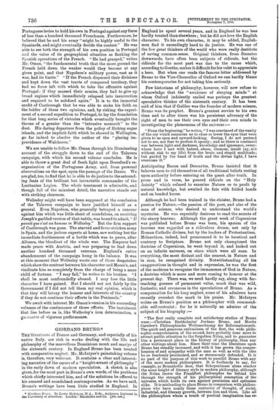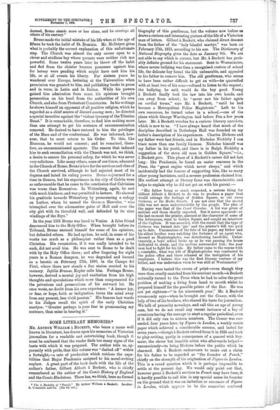GIORDANO BRl7N0.*
THE literatures of France and Germany, and especially of his native Italy, are rich in works dealing with the life and philosophy of the marvellous Dominican monk and martyr of the sixteenth century. In England Bruno has been treated with comparative neglect. Mr. McIntyre's painstaking volume is, therefore, very welcome. It contains a clear and interest- ing narrative of the career of a "knight-errant of philosophy" in the early dawn of modern speculation. A sketch is also given, for the most part in Bruno's own words, of the problems which chiefly interested him, and of the solutions he offered to his amazed and scandalised contemporaries. As we have said, Bruno's writings have been little studied in England. In • Giordano Bruno. By Lewis McIntyre. M.A., D.Sc., Anderson Lecturer in the University of Aberdeen. London : Macmillan and Co. [10s. net.)
England he spent several years, and in England he was less hardly treated than elsewhere ; but he did not love the English character. To his own character, it may be added, English- men find it exceedingly hard to do justice. He was one of the few great thinkers of the world who were really destitute of saving common-sense. Original thinkers, from Socrates downwards, have often been subjects of ridicule, but the ridicule for the most part was due to the cause which, according to Goethe, makes it difficult for his valet to appreciate a hero. But when one reads the famous letter addressed by Bruno to the Vice-Chancellor of Oxford we can hardly blame his contemporaries for not taking him seriously.
Few historians of philosophy, however, will now refuse to acknowledge that the "awakener of sleeping minds" at whom Oxford indolently smiled was perhaps the greatest speculative thinker of the sixteenth century. It has been said of him that if Galileo was the founder of modern science, Bruno was its prophet. Bruno's greatest service to his own time and to after times was his persistent advocacy of the right of men to use their own eyes and their own minds in investigating the phenomena of the universe :—
"From the beginning," he writes, "I was convinced of the vanity of the cry which summons us to close or lower the eyes that were given to us open and upward-looking. Seeing, I do not pretend not to see, nor fear to profess it openly ; and as there is continual war between light and darkness, knowledge and ignorance, every- where have I met with hatred, abuse, clamour, insult (ay, not without risk to my life) from the brute and stupid multitude; but guided by the hand of truth and the divine light, I have overcome it."
Anticipating Bacon and Descartes, Bruno insisted that it behoves men to rid themselves of all traditional beliefs resting upon authority before entering on the quest after truth. In prose and in verse, he poured ridicule on the "Holy Asinity " which refused to examine Nature or to profit by natural knowledge, but awaited its fate with folded hands and on beaded knees.
Although he had been trained in the cloister, Bruno had a passion for Nature,—the passion of the poet, and also of the man of science, who desired to understand the world's mysteries. He was especially desirous to read the secrets of the starry heavens. Although the great work of Copernicus was published before Bruno was born, his system of the heavens was regarded as a ridiculous dream, not only by Roman Catholic divines, but by the leaders of Protestantism. Melancthon, indeed, had pronounced it to be heretical and contrary to Scripture. Bruno not only championed the doctrine of Copernicus, he went beyond it, and looked out on an infinite universe, on stars which were all suns. In everything, the most distant and the nearest, in Nature and in man, he recognised divinity. Notwithstanding all his exaggerations in thought and in expression, he was the first of the moderns to recognise the immanence of God in Nature, a doctrine which is more and more coming to honour at the present day. There was, we need hardly say, along with far- reaching guesses of permanent value, much that was wild, fantastic, and erroneous in the speculations of Bruno. As a compensation for his long neglect, some of his admirers have recently overshot the mark in his praise. Mr. McIntyre writes on Bruno's position as a philosopher with commend- able self-restraint ; for he is naturally an admirer of the subject of his biography :—
"The first really complete and satisfactory studies of Bruno were :—Christian Bartholmess' Jordan() Bruno, and Moritz Carriere's Philosophische Weltanschaung der Reformationszeit. The quick and generous enthusiasm of the first, the wide philo- sophic comprehension of the second, have probably done more to attract public attention to the forgotten Nolan, and to guarantee him a permanent place in the history of philosophy, than any other writings about him. Since their time the literature upon Bruno has steadily increased, and with it has grown the compre- hension of and sympathy with the man as well as with the idea he so fearlessly proclaimed, and so strenuously defended. It . is no part of the purpose of this work to parallel Bruno with any of the more modern philosophers. It is foolhardy to say, for example, as Brunnhofer does, that Schopenhauer alone reaches the same height of literary style in modern philosophy, although tlie Nolan leaves the Frankfort philosopher far behind him through the strength of his philosophical conception of the universe, which holds its own against pessimism and optimism alike. It is misleading to place Bruno in comparison with philoso- phers who have nearly three centuries of thought, of social, industrial, and literary growth, between him and them. Like all the philosophers whom a touch of poetical imagination has re- deemed, Bruno stands more or less alone, and he overtops all others of his century."
Bruno made the initial mistake of his life when at the age of fifteen he took the habit of St. Dominic. Mr. McIntyre gives what is probably the correct explanation of this unfortunate step. The Church was almost the only career open to a clever and studious boy whose parents were neither rich nor powerful. Some twelve years later he threw off the habit and fled from the cloister because processes against him for heresy were pending which might have cost him his life, or at all events his liberty. For sixteen years he wandered over Europe, lecturing at the Universities when permission was granted to him, and publishing books in prose and in verse, in Latin and in Italian. While his powers gained him admiration from some, his opinions brought persecution on his head from the authorities of his own Church, and also from Protestant Consistories. In his writings he shows himself an opponent of all positive religion, which he regarded as a chief source of discord among men ; he directed a special invective against the "violent tyranny of the Tiberine Beast." It is remarkable, therefore, to find him making more than one attempt to get his sentence of excommunication removed. He desired to have restored to him the privileges of the Mass and of the confessional. He was informed, how- ever, that he must return to his Order. To this, like Erasmus, he would not consent ; and he remained, there- fore, an excommunicated apostate. The reason that induced him to seek reconciliation with the Church was not, we think, a desire to ensure his personal safety, for which he was never very solicitous. Like many others, some of our times, educated in the Church of Rome, Bruno's love for the services and rites of the Church survived, although he had rejected most of its dogmas and hated its ruling powers. Bruno sojourned for a time in Geneva, but his experiences in the city of Calvin were so unfavourable that he came to the conclusion that Calvinism was worse than Romanism. In Wittenberg, again, he met with much kindness, and was permitted to lecture. He showed his gratitude towards Wittenberg by pronouncing a eulogy on Luther, whom he named the German Hercules, "who triumphed over the adamantine gates of Hell and over the city girt with its threefold wall, and defended by its nine windings of the Styx."
In the year 1591 Bruno was lured to Venice. A false friend denounced him to the Holy Office. When brought before its Tribunal, Bruno excused himself for some of his opinions, but defended others. He had spoken, he said, in some of his works too much as a philosopher rather than as a good Christian. His recantation, if it was really intended to be such, did not avail him. He was sent to Rome to be dealt with by the Holy Office there; and after lingering for eight years in a Roman dungeon, he was degraded and burned as a heretic on February 17th, 1600, in the Campo dei Fiori, where there now stands a fine statue erected to his memory. Infeliz Brunus, Kepler calls him. Perhaps Bruno, however, derived a mental joy and exaltation from his high thoughts and speculations which more than compensated for the privations and persecutions of his outward lot. He once wrote, no doubt from his own experience: "A keener joy, or fear, or hope, faith or indignation, turns the mind away from any present, less vivid passion." His famous last words to his Judges recall the spirit of the early Christian martyrs: "Greater perhaps is your fear in pronouncing my sentence, than mine in hearing it."































































 Previous page
Previous page